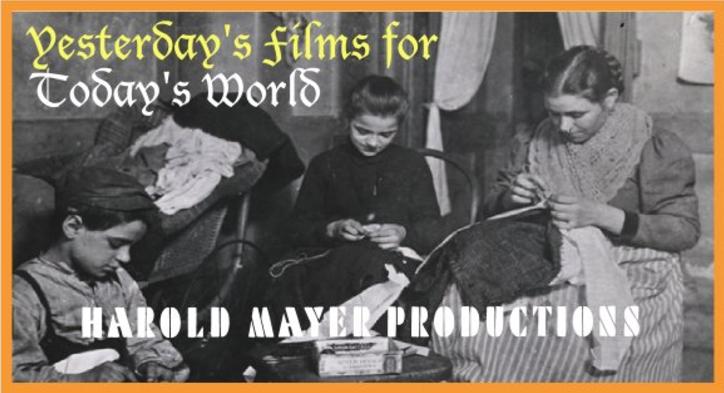HAROLD MAYER PRODUCTIONS

Harold Mayer has produced and directed documentaries for all the networks before forming his own company, Harold Mayer Productions, in 1961. There he did many documentary films for national public television as well as others, including those concerned with issues of social consciousness. These ranged from the very first TV film on family therapy (Trouble in the Family, 1967), to the unspoken scandal of ghetto education (The Way It Is, 1967), many innovative science films, and historical documentary films such as The Inheritance (1964) which brought the issues of labor unions and immigration from the past to their impact on us today. This much honored documentary film is described by the London Financial Times as “one of the great films of our time. Anyone who is not moved by it is spiritually dead,” and the New York Times called it “memorable…with shattering pictorial effects.” Mayer was an early innovator of movement on stills, melding them seamlessly into historic and modern motion picture footage (1964). His films have won national and international awards. He believes that a good documentary film invites the viewer to empathize as well as learn.
In January 2015 Harold and Lynne Mayer donated their collection of films and professional papers to the Wisconsin Center for Film Theater Research. The WCFTR now manages the rights and distribution of Harold Mayer Productions’ materials.
For inquiries regarding obtaining copies or public screenings of any works in this collection, please email wcftr@commarts.wisc.edu.
The following titles are available on DVD for home use for $50:
The Inheritance (58 min.)
Harold Mayer’s much honored documentary film (1964) shows what life was really like for immigrants and working Americans from the turn of the century on. Their struggle to put down roots, form labor unions, survive wars, and demand their rights ultimately created a new and better life for themselves and our nation. The Inheritance was a first prize winner at festivals around the world. The Inheritance explores a landscape largely unknown to the present generation from the dim sweatshops, coal mines and textile mills filled with children to the anxious years of the Depression and labor’s bloody struggle for the right to organize. The films also includes the seldom seen newsreel footage of the massacre at the Republic Steel strike in Chicago. The innovative use of still photos and rare stock footage broke new ground that influenced filmaking for years to come. Dialogued stills and footage feature the voices of many great actors while music sung by Judy Collins, Pete Seeger, Tom Paxton, and others. The film was narrated by Robert Ryan, written by Millard Lampel, and produced and directed by Harold Mayer for ACWA.
Movin’ On (58 min.)
This roaring railroad film (1968) reveals the history and drama of railroading from the Hell on Wheels towns to the robber barons who financed the railroads, and the Irish and Chinese immigrants who built them. Using stills and footage of the period and the words of those who lived and worked through those times, Movin’ On presents history through the eyes of the farmers, the politicians, the adventurers, the miners, the venture capitalists, the unions, the immigrants, the crooks, and the heroes who built our land, and the railroads.
A special ten-minute section of the film deals with the building of the transcontinental railroad. Harold Mayer combines artistry and history using the astounding photos of the period, including prints off A. J. Russell’s original glass plate negatives which were found again and printed for this film. Movin’ On shows the social history of the United States as it pushed its borders to the frontiers and consolidated its finances on both coasts. Your ears as well as your eyes will be delighted by the glorious music of the times, played and sung by the New Lost City Ramblers with Mike Seeger and Bonnie Dobson. The Smithsonian Institution, which has the film in its collection, has called it “one of the finest railroading films ever made.” Arthur Kennedy narrates. Written by Lynne Rhodes Mayer, produced and directed by Harold Mayer for UTU.
L’Chaim: To Life! (80 min.)
This remarkable history of the Eastern European Jews from l870 to l970, shows their marvelous resilience in the face of overwhelming realities. Always armed with a survivor’s sense of humor and an ability to start anew and learn anew and live anew, their story inspires. From the time of the shtetl, the Jews struggled to be allowed to learn a skill, get an education, all of which were denied them. Through the marvelous stills of Roman Vishniac and others, as well as old and rare footage, their story is captured here. The shtetl comes alive as do the Warsaw ghetto, the Displaced Persons camps, and most important, the people. L’Chaim To Life (1970) was seen by an estimated forty million people when all the TV networks showed it. A history of the Eastern Europen Jews from 1870 to 1970, it was called “A film that should be seen everyday, forever.” Narrated by Eli Wallach. Dialogued stills and footage feature the voices of many great actors. Written by Lynne Rhodes Mayer, edited by Alan Pesetsky. Produced and directed by Harold Mayer for WAO.
Is there an American Stonehenge? (28 min.)
Is professor John Eddy right? This film will prove his theory: that the Native Americans who built the famous Medicine Wheel in the Big Horn Mountains of Wyoming so many centuries ago were scientists. Join Harold Mayer and his crew as they set up in the bitter cold and wind, to test Eddy’s theory as the snow falls in late June, the time of the summer solstice. The cameras will record whether or not the rays of the rising sun will indeed strike between the ancient stones that had been set so long ago. If so this site was built as an astronomical observatory to measure the arrival of the summer solstice. The stunning scene climaxes as the sun rises in the heavens, sending its rays directly over the center post between the stones, as predicted by Eddy. It proved the astronomical acumen of the Native American as scientist. The viewer shares directly in that thrilling moment of scientific history. Eddy narrates. Written by Lynne Rhodes Mayer and Michael Pessah, camerman Gene Searchinger, produced and directed by Harold Mayer.
